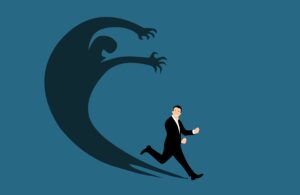We have long since (…) touched Mars, the Moon, harnessed nuclear power, artificially reproduced DNA, and now have the biochemical means to control births; why should death itself, « the last enemy », be considered sacred and beyond conquest? Alan Harrington, novelist, 1977 (The immortalist).
Theme of the month: The Terror Management Theory
Introduction
Terror Management Theory (TMT) was developed in the 1980s by Jeff Greenberg, Tom Pyszczynski and Sheldon Solomon.
According to these authors, all human beings are confronted with two realities.
On the one hand, humans, like all animals, have an instinct to protect themselves and to try to survive. On the other hand, they have a higher level of self-awareness that allows them to understand, unlike other animals, that they are alive and that they will eventually die.
It undeniably involves the frustration of the desire to stay alive. This is both frightening and motivating, and represents a central and unique psychological conflict in human beings.
But this theory, already discussed in a letter The Death of Death from May 2010, also teaches us that man, in order to face the fear of death, has developed defense mechanisms. Knowing that we are not going to survive as individuals, we identify ourselves with the collective, our survival goals become collective goals. In a global vision, we could say that all forms of art, culture, tradition, long-term collective construction participate in this mechanism. It is a matter of valuing the culture of belonging that allows us to strengthen our self-esteem in the conviction that as individuals we contribute to building this sense.
Unfortunately, this mechanism also has negative aspects. By reinforcing group values, it encourages the rejection of those who are different. Here, as in other areas, fear is a bad counsellor, a counsellor of withdrawal not into oneself, but into one’s group.
How has Covid-19 influenced our reaction to death?
The coronavirus pandemic has reminded us how vulnerable we are, especially as we age. A fact we put out of our minds when times are less threatening.
Across the world, we have seen solidarity, but also withdrawal: some have mobilized to help others (e.g. making protective gear for caregivers or organizing fundraisers), others have stockpiled cans and toilet paper.
Some recent studies show that the perception of threat (Covid-19) is related to government decisions such as lockdowns (if the government orders lockdowns, the disease must be very serious) and to the number of reported cases. The increase in the number of cases in some countries would be correlated with the increase in conservatism and authoritarianism.
Only humans are affected
As already written, awareness of inevitability of the death is unique to humans. It is possible that some animals are aware of the death of their fellow creatures and the risk to themselves. Moreover, this awareness does not even concern all humans. Young children usually live a life that seems limitless to them with joy and without boredom.
Could it be human nature to learn how to die…
Neither the sun nor death can be looked at steadily, wrote La Rochefoucauld. To philosophize is to learn to die, as Socrates and Montaigne have said. No conscious adult human being is indifferent to the inevitability of his end. Faced with the passing of time, we feel, as on the edge of a precipice, fear, but also fascination. No civilization deals with the death of our fellow human beings without a specific approach.
Or could it be the nature of man to always struggle to overcome death?
Almost all civilizations, almost all religions, explain that death is not the end of the journey. From an agnostic perspective, the main reason for beliefs in the afterlife is of course to deal with the fear of dying. The search for immortality is found in beliefs, practices and rituals. Sometimes these are affirmations, incantations. Sometimes they are methods that could be called « pre-scientific », instructions for avoiding death or for making death only a temporary phenomenon.
For the Taoists, it was a matter of learning to live according to very ascetic methods. In ancient Egypt and Christianity as it was taught until recently, it was a matter of preserving the body, by embalming or burial to allow for the return, the reincarnation (return to the flesh). The Catholic Church refused cremation until recently.
An unconscious mechanism
This is a fundamental aspect of managing terror. Our defences are constituted by what Ernest Becker called « The Denial of Death« . Faced with what is both unbearable and inevitable, we develop unconscious processes. If these processes were conscious, they would lose much of their effectiveness.
What about tomorrow, in a world where amortality becomes conceivable?
Living without unbearable fear is, of course, a desirable mechanism. But it can also be an obstacle to the struggle for healthy longevity, when unconscious mechanisms lead us not to fight against, or even to « love » death (from old age).
Collective ideals are the result of feelings of belonging to groups that were initially opposed to each other. Today, they allow us to behave in an increasingly global community to live in a more peaceful, more united and more sustainable way, especially in the fight against global warming. In the same way, tomorrow, a better « management of the fear of death » could allow us to make better progress towards a much longer healthy life, even one day without time limits.
Good news of the month
- Although this is a fragile development, mortality from the Covid-19 epidemic is slowing down. While the number of people affected continues to rise, the number of deaths both in Belgium and worldwide is decreasing, showing the increasing effectiveness of preventive vaccines and therapeutic treatments.
- Among the most promising treatments for the coronavirus, molnupiravir is providing renewed hope: the tablet is believed to halve the risk of hospitalization or death in Covid-19.
For more information:
- See in particular: heales.org, sens.org, longevityalliance.org and longecity.org.
- Source of the image


